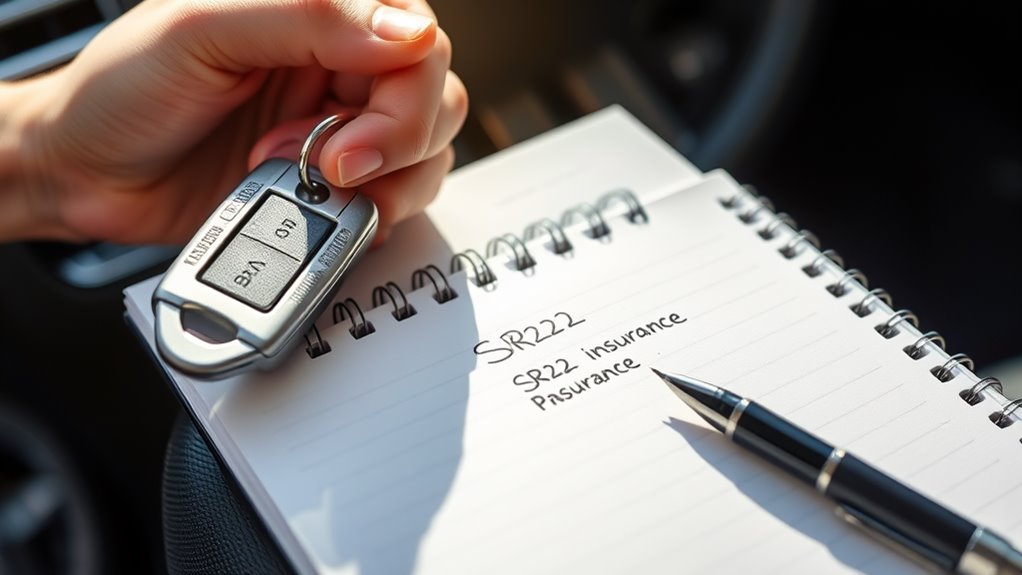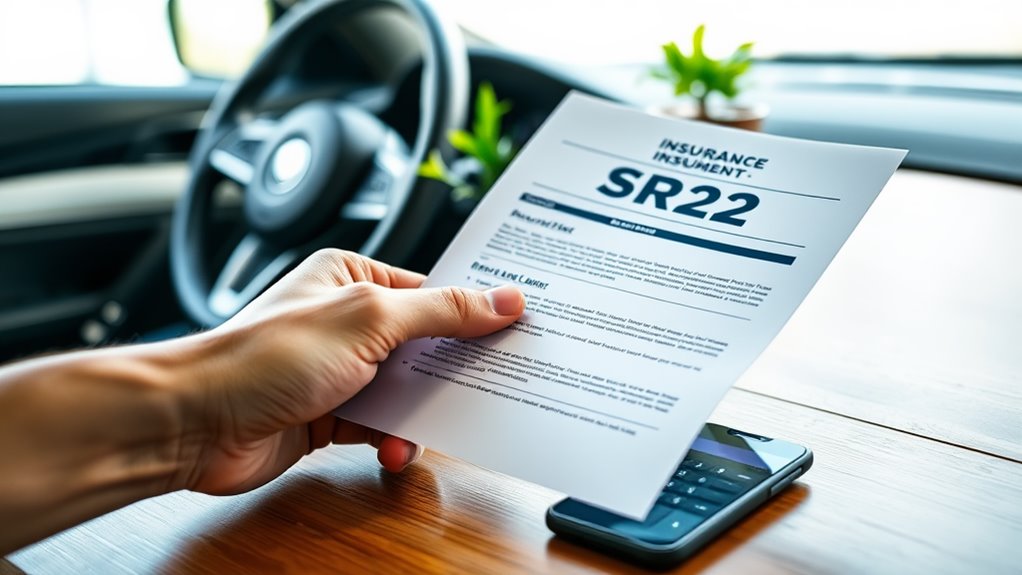7 Tips for SR22 Insurance After License Suspension
Imagine maneuvering through the aftermath of a license suspension, where securing SR22 insurance feels like an intimidating maze. You might be wondering how to find the right coverage without breaking the bank. Understanding the essential steps can streamline this process and minimize stress. From evaluating your driving history to exploring financial assistance options, there are key strategies to reflect upon. Let's explore how to effectively manage your SR22 insurance journey.
Key Takeaways
- Compare quotes from multiple insurers to find the most affordable non-owner SR22 insurance rates tailored to your needs.
- Ensure continuous coverage during the SR22 period to avoid penalties and maintain compliance with state regulations.
- Set up automatic payments for premiums to prevent lapses in coverage that can lead to further suspension.
- Monitor your driving record post-suspension to maintain a clean status and potentially lower future insurance premiums.
- Consider specialized insurers like The General or SafeAuto for competitive pricing on non-owner SR22 insurance policies.
Understand the Basics of Non-Owner SR22 Insurance

When you need to meet state insurance requirements after a license suspension but don't own a vehicle, non-owner SR22 insurance is your solution. This type of insurance provides liability coverage, ensuring you comply with state minimum insurance laws. To be eligible, you mustn't own a vehicle or live with someone who does, and you must have a valid driver's license. Common infractions requiring SR22 include DUI, driving without insurance, and repeated traffic offenses. While the SR22 filing fee is typically around $25, the actual cost of the policy varies by state and insurer. Remember, non-owner SR22 policies don't cover vehicle damages, making them more affordable than standard insurance policies. Additionally, some insurers may not offer SR-22 filings for non-owner policies, so it's important to check with your provider. This option can significantly reduce your expenses, as affordable SR-22 insurance options are available for non-owners.
Determine If Non-Owner SR22 Insurance Is Right for You
Are you unsure if non-owner SR22 insurance is the right choice for you? Consider these factors to help you decide:
Unsure if non-owner SR22 insurance suits you? Evaluate your driving history, vehicle ownership, and state regulations to make an informed choice.
- Driving Violations: If you've faced DUI or other serious driving offenses, this insurance can help reinstate your driving privileges.
- No Vehicle Ownership: Non-owner SR22 is ideal if you don't own a vehicle but frequently borrow or rent cars.
- State Requirements: Check your state's specific liability coverage requirements; this type of insurance may be necessary for compliance.
Shop Around for Affordable Non-Owner SR22 Insurance Options
Finding affordable non-owner SR22 insurance options can feel overwhelming, but it's essential to compare quotes from various insurers to guarantee you get the best deal.
Start by targeting specialized insurers like The General and SafeAuto, known for competitive rates for high-risk drivers. Don't overlook Direct Auto Insurance and National General, which also offer tailored non-owner policies.
Remember that rates can vary considerably, so use online tools or agents to streamline your comparison process. Additionally, keep state regulations in mind, as they may affect your options and pricing.
Maintain Continuous Coverage During the Suspension Period

Maintaining continuous coverage during your SR-22 period is essential to guarantee compliance and avoid further penalties.
Continuous coverage during your SR-22 period is crucial for compliance and avoiding additional penalties.
Any lapse in coverage can lead to immediate notification to the DMV, resulting in another suspension. To stay on track, consider these tips:
- Make Regular Premium Payments: Set up automatic payments to make sure you never miss a due date.
- Stay Aware of State Requirements: Know your state's minimum coverage duration, often three years, and adhere to it.
- Monitor Your Driving Record: Keep a clean record during this period to prevent complications with your insurance.
Know the SR22 Filing Requirements in Your State
When maneuvering through the SR22 filing requirements in your state, it's crucial to understand that each jurisdiction has its own specific rules and regulations.
First, you'll need either a court order or a notice from your state's DMV to start the process. SR22 filings are typically required for violations like DUI, DWI, driving without insurance, or repeat traffic offenses.
The type of certificate you need—owner, non-owner, or operator/owner—depends on your situation. Most states mandate a minimum coverage level, which you must maintain throughout the filing period, usually lasting three years, but it can vary greatly.
Always consult local regulations to verify compliance and avoid any lapses that could lead to further license issues.
Plan for Increased Insurance Premiums After License Suspension
After a license suspension, you'll likely face a significant increase in your insurance premiums, making it essential to plan accordingly.
To help you navigate this financial challenge, consider these strategies:
Consider these strategies to effectively manage increased insurance costs after a license suspension.
- Budget for Higher Costs: Expect an average monthly increase of around $120.25, which can add up quickly. Factor this into your monthly expenses.
- Shop Around: Different insurers may have varying rates for SR-22 filings. Compare quotes to find the best deal that fits your budget.
- Maintain a Clean Record: Avoid additional traffic violations post-suspension. A clean driving record can help lower your premiums over time.
Seek Financial Assistance if Needed for SR22 Insurance Costs

If you're struggling to manage the costs of SR22 insurance after a license suspension, seeking financial assistance can ease your burden.
Start by contacting your state's Department of Motor Vehicles, as they may offer financial aid programs. Local non-profit organizations can also provide assistance for auto insurance costs.
Look for insurance providers like GEICO or Breathe Easy Insurance, which may offer flexible payment plans or discounts. Additionally, consider consulting a financial advisor to help with budgeting.
Explore community resources and government programs that assist low-income individuals with SR22 costs. Utilizing these options can greatly reduce your financial stress and help you get back on the road more affordably.
Conclusion
Steering the waters of SR22 insurance after a license suspension can feel like sailing through a storm. By understanding your options and preparing for what lies ahead, you can guide your ship toward calmer seas. Remember to keep your course steady with continuous coverage and a clean driving record. With each wave you overcome, you'll find your premiums dropping and your path to reinstatement clearer. Don't hesitate to seek assistance; even the strongest captains need a crew to help them steer.
